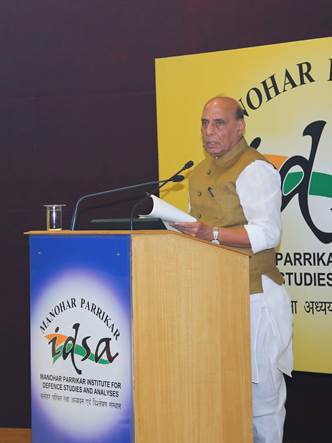India’s Vision of ‘Adaptive Defence’

- 13 Nov 2024
In News:
- Defence Minister Shri Rajnath Singh introduced the concept of ‘Adaptive Defence’ at the inaugural Delhi Defence Dialogue (DDD).
- Adaptive Defence aims to prepare India's military for the rapidly changing landscape of modern warfare, with evolving threats and technologies shaping global security.
Key Aspects of Adaptive Defence:
- Strategic Approach:
- Adaptive Defence is an evolving strategy where military and defence systems continuously adjust to emerging threats, focusing on proactive preparedness rather than reactive responses.
- It is based on anticipating future threats, fostering flexibility, resilience, and agility in both strategic and tactical responses.
- Core Elements:
- Situational Awareness: The ability to understand and respond to dynamic, often unpredictable environments.
- Flexibility & Agility: At both the strategic and tactical levels to ensure swift and effective responses.
- Resilience: The capacity to recover and adapt quickly to unforeseen circumstances.
- Integration with Emerging Technologies: Emphasis on adopting cutting-edge technologies like AI, drones, and cybersecurity to stay ahead of adversaries.
The Changing Nature of Warfare:
- Grey Zone & Hybrid Warfare:
- Modern conflicts now often occur in the grey zone and involve hybrid warfare, blending traditional and non-traditional threats like cyber-attacks, terrorism, and psychological warfare.
- These new threats demand continuous adaptation in strategies, doctrines, and military operations.
- Technological Transformation:
- Drones and swarm technologies are reshaping warfare. India aspires to become a global hub for drones, leveraging these technologies for both economic and military growth.
- The increasing significance of Artificial Intelligence (AI), cyber capabilities, and quantum technologies in defence highlights the need for international collaboration in research and innovation.
- Psychological Warfare:
- The rise of information overload and psychological warfare challenges traditional defence paradigms. Manipulation of information to influence public opinion and disrupt decision-making processes is now a key threat.
Government Initiatives for Adaptive Defence:
- Institutional Strengthening:
- Establishment of the Chief of Defence Staff (CDS) and initiatives to enhance jointness among the three armed services (Army, Navy, Air Force) to create a unified strategic force.
- Reform of training curricula and emphasis on integrated operations to ensure readiness for new-age warfare.
- Focus on Self-Reliance:
- Strengthening the indigenous defence sector through initiatives like Make in India and the Aatmanirbhar Bharat campaign.
- Increasing foreign direct investment (FDI) in defence and promoting defence exports, with India currently exporting to over 100 nations.
- Drone Hub Vision:
- India aims to become the world’s drone hub, supporting R&D and fostering innovation to develop reliable certification mechanisms and enhance Indian intellectual property in the drone sector.
- Programs like iDEX (Innovations for Defence Excellence) and ADITI are rewarding innovation and driving India's defence sector towards greater self-sufficiency.
- Technology and Innovation:
- Focus on cybersecurity, AI, and quantum technologies to develop solutions that address both national and global security challenges.
- India is also working on Theaterisation, integrating the three services into a unified force structure for enhanced coordination and joint operations.
- Defence Acquisition and Export:
- Introduction of the Defence Acquisition Procedure 2020, establishment of Defence Industrial Corridors in Uttar Pradesh and Tamil Nadu, and a Positive Indigenisation List to boost self-reliance.
- India is actively increasing defence exports, aiming for Rs 50,000 crore worth of exports by 2029, with key export destinations including the USA, France, and Armenia.
Strategic Vision for the Future:
- Collaborative Approach:
- Given the interconnectedness of global security, the defence minister emphasized the importance of a collaborative approach in dealing with transnational threats.
- Cross-border issues, cyberspace threats, and the potential of quantum and nanotechnologies demand the sharing of knowledge and strategies across borders.
- Joint Military Vision:
- Jointness in defence strategy should go beyond national borders and should involve international cooperation in response to global security challenges.
- The need for interconnected solutions in the face of transnational threats underscores the importance of multilateral cooperation.
